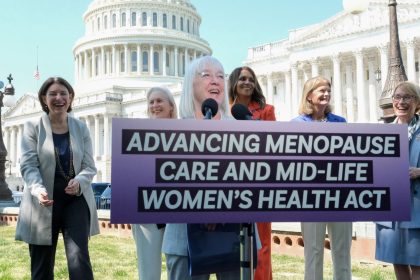AHA and Congress Request Federal Investigation Into Nurse Staffing Agencies

WASHINGTON — The American Hospital Association, health care organizations and nearly 200 members of Congress sent letters to White House officials in January requesting an investigation of nurse staffing agencies based on claims they’ve been exploiting staffing shortages during the COVID-19 pandemic by hiking up the pay rates for contract nurses.
“The American Hospital Association has not advocated in any forum for a cap on travel nurse wages — we, like the members of Congress — have called upon the Federal Trade Commission to determine if there is anticompetitive conduct at the root of the tremendous price hikes,” said a spokesperson from the AHA, in an email to The Well News.
In the letters, the Federal Trade Commission and other agencies are asked to determine whether increased rates are translating to higher pay for contract nurses, the impact on price hikes in rural and underserved areas and if the activity of nurse staffing agencies is violating consumer protection laws and churning a profit during the pandemic.
“We are concerned that these traveling nurses are only getting a fraction of what the agency is charging the facility,” said a spokesperson from the American Health Care Association, in an email to The Well News.
SUBSCRIBE | sign up now for TWN’s health news email, Fare Well
The AHA has spent more than a year issuing letters with the same concern to White House officials, with one letter sent in November, and another sent in February of last year to the FTC.
According to the spokesperson from the AHA, the average pay for hospital travel nurses has more than doubled compared to pre-pandemic levels.
There was also a 67% increase in the advertised pay rate for travel nurses from January 2020- January 2022, and hospitals are billed an additional 28%-32% over those pay rates by staffing firms, according to data from Prolucent Health, a company which collects data on the U.S. workforce and technology.
“Some travel nurse staffing agencies are charging as high as $240 an hour or more,” said the spokesperson from the AHA.
Laura Wattigney, a 29-year-old travel nurse working in North Carolina, said in an email to The Well News that she currently makes about $100 per hour and works about 36-48 hours a week, although the rate of pay can vary depending on the staffing agency.
Wattigney previously worked as a staff nurse in an oncology unit for four years in Baton Rouge, Louisiana, before she decided to start travel nursing in February 2020.
“There’s many reasons why I chose to step away from being a staff nurse, but the main reason is I wasn’t getting paid for the amount of work I was doing,” said Wattigney.
Since then, Wattigney has moved among multiple states where she typically works for three months at a time offering medical assistance to hospitals which are experiencing staffing shortages.
“If there’s no nurses, there’s no hospital. Sometimes nurses are forced to have more than one role. I was housekeeping, a phlebotomist, respiratory therapist, transporter and nurse all in one. It’s exhausting,” said Wattigney.
In one of her assignments as a travel nurse, Wattigney worked at a long-term COVID facility where she tracked the oxygen levels of patients on ventilators who were battling COVID-19.
“The pay was double after the first assignment, but the amount of work was rough. On most nights I [had] six, or sometimes seven patients, due to short staffing. It caused a lot of burden on my mental and physical health. Most nights it made me question if nursing was right for me,” said Wattigney.
Wattigney said she has never heard from any travel nurses that they are demanding higher pay for their work and it was known even before the pandemic that travel nurses make nearly double the salary of staff nurses.
A staffing nurse based in Los Angeles said during a phone call with The Well News that travel nurses have always been a vital resource during staffing shortages, but now they have been filling in major gaps of shortages in the OB-GYN department where she works.
“We have significantly more travel nurses right now than we have ever had because we had a significant turnover rate and needed nurses badly. A lot of nurses quit, went back to school, re-evaluated their careers in general,” said the staffing nurse.
“The nice thing about travel nurses is they come and help immediately, and within a week of orientation they are there to help,” she continued.
In most cases, a staff nurse takes about three to six months to train to get set up in their department but a travel nurse can typically be trained in three days and immediately put on the floor to start assisting with patients.
This is important, especially, the staffing nurse said, for maintaining safe staffing ratios which are mandated by the state of California to protect health care workers from dangerous volumes of work.
There are currently only 15 states which have safe staffing ratio laws, but California is the only state that stipulates in law and regulations that a minimum nurse to patient ratio needs to be maintained at all times by a unit.
Massachusetts also passed a similar law, but it is specific to the ICU and requires a 1:1 or 1:2 nurse to patient ratio.
There are no current federal mandates to regulate the number of patients a nurse can care for at one time in U.S. hospitals, but there have been efforts pushing for a national nurse staffing standard for hospital patients and a safety and quality care act from organizations like National Nurses United.
For now, states which do not have any safe staffing ratio mandate as part of their laws and regulations could see a nurse-to-patient ratio of 1:10 in an ICU unit.
Although none of the letters sent to the White House have any clear requests for a federal level policy that would cap the pay of contract nurses, a few states have already proceeded in setting anti-competitive regulations for staffing companies.
There are two states, Minnesota and Massachusetts, which have placed a cap on staffing firms’ pay rates to prevent anti-competitive behavior.
Pennsylvania, Illinois, Kansas and Kentucky may also soon join the list as they have introduced or plan to introduce legislation for pay caps.
There has also been an uproar from the travel nursing community in recent weeks in response to the letters, such as an online petition started by groups of nurses on Change.org which aims to stop any possible cap on travel nurses pay.
Some of the nurses interviewed by The Well News said a protest is being organized on Capitol Hill by groups of nurses to take place on May 12, to request Congress start prioritizing the physical and mental health needs of nurses instead of hospital CEOs.
For Wattigney, who recently fell ill with COVID-19 and has been battling depression and anxiety relating to the stressful nature of her work, any possible pay cap for travel nurses would add challenges to those who are already pushed to the brink.
“A payment cap [would] definitely impact my ability to work. I know my worth and most other nurses do too… I’m getting paid for what I do for a reason,” said Wattigney.
Alexa can be reached at [email protected]

























